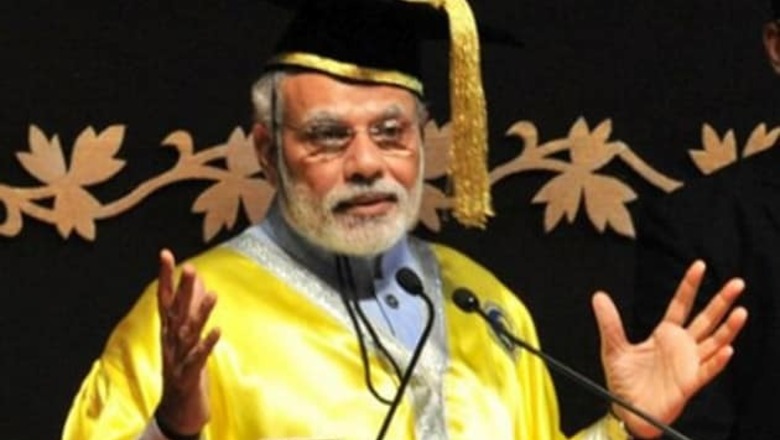
views
The Narendra Modi government seems to have touched a raw nerve when its Home Ministry issued a circular on the use of Hindi on social media. In a circular issued in May 2014, the Ministry wanted preference be given to Hindi by central government employees and employees of public sector undertaking and banks while using social media such as Facebook, Twitter, Google, You tube and blogs. It also issued circular offering cash incentives of Rs. 1600, 1200 and 600 for people who use Hindi for official work.
Language is a highly emotive issue and sometimes can cause irreparable damage when wrongly addressed. There is evidence to that effect.
Former finance minister P Chidambaram rightly warned the centre on possible backlash from the South especially Tamil Nadu. Even BJP's ally at the centre PMK Founder-leader Ramadoss came out openly against the ‘advise' to use Hindi in social media.
Such moves, subtle and not-so-subtle will give a much needed boost to (Dravida Munnetra Kazhagam) DMK leader Karunanidhi to stoke the language issue once again when DMK is languishing under the cloud of 2G scam and problems faced by its family members Maran brothers. Even AIADMK leader J Jayalalithaa, wrote to Prime Minister Modi to remove the obnoxious circular.
The language issue exploded back in the 1960s when ruling Congress party burnt its fingers when a similar exercise was launched.
There was vehement opposition in the south mainly spearheaded by Periyar EV Ramaswami Naicker, CN Annadurai, M Karunanidhi and others in Tamil Nadu when government tried to impose on non-Hindi speaking States in the sixties. This resulted in Congress losing power to DMK in Tamil Nadu which the party has never been able to get back.
DMK came into existence mainly playing up the anti-Hindi feeling that Tamil language will have to play second fiddle to Hindi and more importantly fanning the fears of Tamilians that those who did not know Hindi will lose their jobs. This alone was sufficient for them to sweep the polls in 1967 and firmly entrench DMK in power.
The anti-Hindi feeling spread to Bangalore too when a largely peaceful crowd raised slogans against Atal Bihari Vajpayee and LK Advani, both Jan Sangh members then, when Vajpayee started his speech in Hindi at a public meeting organised by Yuvaka Sangha in Bangalore. The crowd shouted ‘down with Hindi' and ‘English, English Please!' and when an unfazed Vajpayee continued to speak in Hindi, the crowd booed and pelted stones which forced the organizers to cancel the programme.
In a way such protests were an enigma. Whereas, on one side most people enthusiastically learnt to sing Hindi songs despite not fully comprehending their meaning; Hindi film producers counted on the huge market of south for their films to become hits.
However, the same public was abhorrent when Hindi was sought to be made compulsory for jobs and promotions. Girls willingly went to Dakshin Bharath Hindi Prachar classes and became proficient in Hindi and millions simply went gaga over Binaca Geet Mala over radio every Wednesday evening. Bollywood has done more for the cause of Hindi than any government since independence.
Naya Daur and Jis desh mein Ganga Bethi Hain ran for silver jubilees in South and the same crowd would protest when government sought to meddle with their career by introducing circulars in Hindi which nobody understood.
The point was Hindi was fine as long as there was no pressure and compulsion from government to ‘push it down the throat'. Such a move was resisted tooth and nail. The Indira Gandhi government then learnt a costly lesson when it lost power in Tamil Nadu.
In a slightly different way, how the emotive issue of language could be used was demonstrated by late NT Rama Rao, the Telugu actor who singlehandedly overthrew Congress government in Andhra Pradesh. When Rajiv Gandhi upbraided his own Congress chief minister and elderly T Anjaiah at Begum Airport in Hyderabad in front of all and sundry, NTR called upon people to show their Telugu pourusham (pride), when one of their own was insulted by a northerner.
Campaigning on the top of a beaten down Ford, for a party which he founded and called ‘Telugu Desam', Rama Rao repeatedly harangued public on the ‘insult' to Telugu people and won a landslide victory in 1983.
The Modi government, at least some of its members seem to be overly enthusiastic approach in their efforts to impose Hindi. Needlessly, government directed central government employees and employees of Central Public Sector Undertakings to use Hindi or both English and Hindi on their web page in social media like Twitter, blogs you- tube, Face book and Google.
India is a multinational, multi-ethnic country with thriving and throbbing populace speaking 22 languages and hundreds of dialects. It has seamlessly marched on united despite its diversity of culture, religion and language. In fact that has been the strength and cornerstone of India's democracy.
To impose a language, belief and culture by any means however noble, would be akin to disturbing its delicate fabric which is made of different hues and texture. Governments in the past have learnt through costly mistakes to stay away from such desperate acts.
So far Modi government has assiduously built an image of harmony and friendship that seeks to carry the nation forward with development as its main platform. States both BJP and Non-BJP, have enthusiastically responded to its various initiatives. To sour it with some ill-conceived notions to impose Hindi will only impede progress at the same time making people wary about Government's intentions.
Wouldn't imposition of Hindi weaken Modi government? History seems to affirm that.
(ER Ramachandran is a noted sports writer and a commentator on current affairs)
















Comments
0 comment